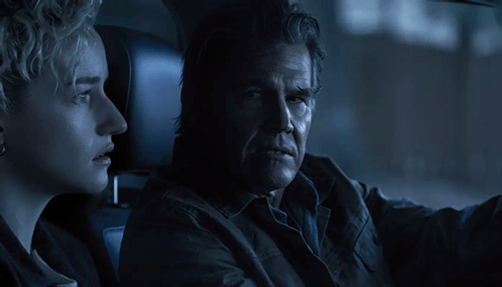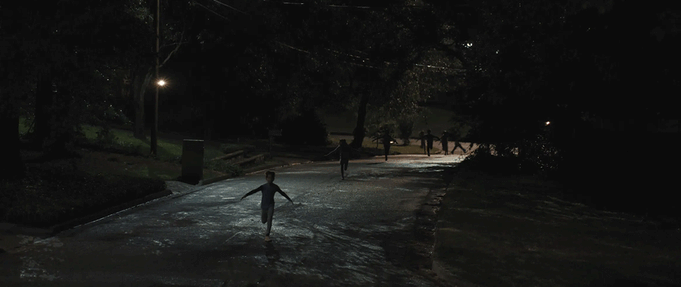Weapons opens on a dark suburban road, with street lamps casting subtle shadows, as a stampede of children gathers. Their arms are all held in a downward V position, as various clips strung together show them running across neighbors' yards and over fences.
It is incredibly eerie, with the pajama-clad children all seeming to be pulled by and to an inexplicable force—one that won't be revealed until the film's final act.
Yet a young girl's voice, accompanied by George Harrison's “Beware of Darkness,” narrates: “This is a true story. It happened right here in my town two years ago.”
Her youthfulness offers a different feeling, that of innocence. Such will only be further emphasized later in the film, when a semiautomatic rifle appears, looming over the entire town.
Sitting in the theater, staring up at the screen, the image was not lost: the AR-15 is often the weapon used in mass shootings in the United States. And this message is only reinforced in consideration of Weapons' plot centering on the mysterious disappearance of 17 children.
Set in the fictional place of Maybrook, Pennsylvania, Weapons follows all the kids who disappear from one class at the local elementary school. The narration explains how the new teacher, Ms. Justine Candy (Julia Garner), showed up to her class one day, to find that everyone was absent—except for one boy named Alex Lilly (Cary Christopher).
Shortly after, the police investigation revealed that at precisely 2:17 AM, the children were shown on security cameras fleeing into the darkness. As the plot speeds along and tensions rise, many fingers turn to point at the most likely culprit, the one person whom all these children seem to have in common: Justine.
One parent in particular, whose son Matthew is among the 17 missing, is hellbent on getting answers.
Archer Graff (Josh Brolin) yells at the conference where the story starts, "Why just her classroom? Why only hers?" referring to Justine, who is sitting in the front row of the auditorium.
At this point, these are some of the many questions we as viewers are asking, drawing us to keep watching—to find out why.
The writer-director Zach Cregger has previously established himself as an expert in delay and misdirection with Barbarian. A critical and commercial hit, the film consistently plays with viewers' expectations while maintaining an ominous tone.
Eliciting several jump scare reactions in the process, Cregger actually subverts horror stereotypes—particularly in Barbarian, the trope of the creepy stranger with hidden motivations.
With 92% on Rotten Tomatoes, many viewers and creatives alike were anticipating Cregger's successor. It's no surprise, then, that there was a bidding war among studios for the rights to Cregger's script, which was ultimately won by New Line Cinema—a subsidiary of Warner Bros—for $38 million.
Reportedly, Jordan Peele, director of Get Out and Us, fired two members of his management team after being outbid and missing out on the opportunity for Weapons. And if you've seen the film, perhaps you'll understand why.
The film is told from the perspective of several characters after beginning with Justine, who has the longest portion, including the previously mentioned Archer, attempting to make sense of his son's disappearance; Paul Morgan (Alden Ehrenreich), a police officer who is routinely led by impulse; James Anthony (Austin Abrams), an unhoused drug addict looking for a way to make quick money; Marcus Miller (Benedict Wong), the school principal, who is trying to support Justine; and finally, Alex, the only kid from Justine's class who didn't run into the night.
Together, their perspectives piece together the narrative, culminating in the grand reveal of the villain, Gladys Lilly. She has been revealed to the audience in snippets, first in Archer's dream, then in the forest with James.
But it is only when she comes to the school, acting as Alex's guardian in conversation with Marcus, that she fully materializes—red hair, colorful makeup, neon jumper, and all.

From Alex's perspective, making up the final part of the film, only a few details are given to viewers about Gladys' character, namely that she is welcomed into Alex's home under the pretense of being his mother's aunt.
But, overall, little is known about who she is and where she came from, beckoning the question: has she done this before?
Even when it is revealed that the kids have been in Alex's basement the whole time, under Gladys' trance, we are never told what she gets from them, which many have noted as a fault.
On a similar note, Cregger commented on another criticism of the film: the huge plot holes. Yet, as Cregger claimed to CinemaBlend, "it's all subjective," with each narrator being unreliable in their recall of events.
Remember the opening scene, where a child's voice says that "this is all true." And of course, none of this is true—we are watching a movie, in which, like all other movies, we are explicitly asked to suspend reality over a two-hour period.
I'm partial to the view that mystery is necessary in great horror, and that not everything needs an explanation. Although there is catharsis in the end, the children are not and will probably never be the same again.
In real life, too, many terrible things are happening, day to day, like the presence of mass shootings, that can and should never be explained away. Gladys, in many ways, with her sudden appearance and brutal exit, embodies that injustice.
So, if you haven't had the chance yet, go experience this movie in a theater before it's too late. You'll laugh, scream, probably laugh some more, and above all, be partaking in something special.
A movie that is doing away with what has become the hollow expectations of horror and offering, instead, surprise.
Watch the Trailer for Weapons
Featured still from 'Weapons' via Warner Bros.
